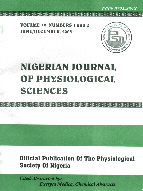
|
Nigerian Journal of Physiological Sciences
Physiological Society of Nigeria
ISSN: 0794-859X
Vol. 32, No. 1, 2017, pp. 105-108
|
 Bioline Code: np17016
Bioline Code: np17016
Full paper language: English
Document type: Short Communication
Document available free of charge
|
|
|
Nigerian Journal of Physiological Sciences, Vol. 32, No. 1, 2017, pp. 105-108
| en |
Effects of Unripe Musa Paradisiaca  on the Histochemistry of the Testis and Testosterone Levels in Adult Albino Rats on the Histochemistry of the Testis and Testosterone Levels in Adult Albino Rats
Alabi, A.S.; Omotoso, G.O.; Tagoe, C.N.B.; Akinola, O.B. & Enaibe, B.U.
Abstract
Summary: This study was aimed at determining the effects of the unripe fruit of Musa paradisiaca on the testis and testosterone levels in male Wistar rats. The animals were grouped into three, comprising a control, and 2 treatment groups administered with different doses (500 mg/kg and 1000 mg/kg) daily of the fruit flour over 28 days. Histochemical evaluation of the testes was done using Haematoxylin and Eosin, Periodic acid Schiff’s (PAS) and Feulgen staining techniques, while the serum and homogenised testicular tissue were evaluated for testosterone levels using Accu-Bind ELISA Kit. The testis of the treated groups showed more rapidly dividing cells and more population of sperm cells compared to the control group, and also showed more positivity for Feulgen staining and PAS reaction. Both serum and testicular testosterone levels were however reduced. Serum testosterone was significantly lowered in the animals given the low dose (0.67 ± 0.03 ng/ml), compared to those given high dose (0.85 ± 0.02 ng/ml) and the control animals (1.88 ± 0.15 ng/ml) (p < 0.05). Changes in testicular testosterone were not statistically significant. The study suggests that M. paradisiaca fruit has reproductive enhancing potential when consumed moderately, but this benefit may not be related to testosterone levels.
Keywords
Musa paradisiaca; Testes; Testosterone; Histochemistry
|
| |
© Copyright 2017 - Physiological Society of Nigeria
|
|
